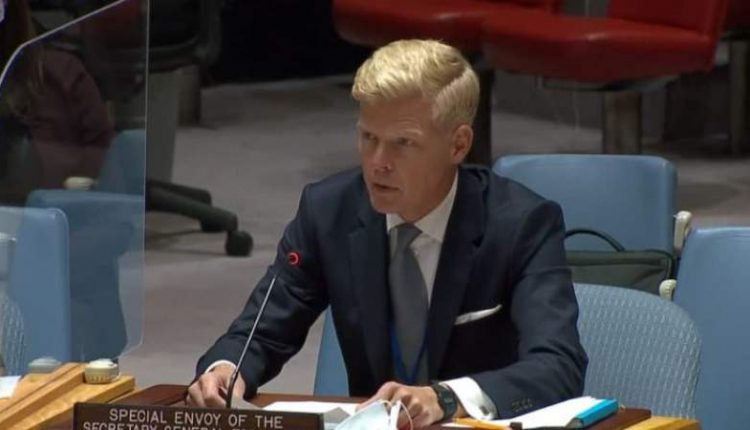Briefing of UN Envoy to Yemen Full of Unrealistic Statements
The briefing of the UN envoy to Yemen cast heavy shadows on the political and economic scene in the country, as part of a seemingly endless rumination process to continue the war and blockade.
The briefing of Hans Grundberg contained many inaccuracies about the reality of what was happening. In addition to the envoy’s ovation of opening limited flights between Sana’a airport and Jordan, and showing that step as an achievement to be reckoned with for Saudi Arabia, Grundberg shuffled the cards with regard to the war of starvation that the people of Yemen are being subjected to, at the hands of the coalition. This is by calling on “the parties in Yemen to immediately de-escalate economically and address near- and longer-term economic priorities,” according to the UN envoy, in a briefing to the UN Security Council on Monday.
Observers believe that Grundberg’s call, addressed to all parties for an economic calm, indicates dangerous dimensions through which the UN seeks to push Sana’a to make concessions on the rights and interests of the Yemeni People, as part of the continuous extortion operations practiced by the UN against Yemen.
Yemeni human rights activists accuse the UN of ignoring the starvation war waged by the US-Saudi aggression against the people of Yemen outside international law and humanitarian law. It is a disregard that does not deviate from the context of the UN neglect of the serious crimes and violations committed by the US-Saudi aggression against the Yemenis in a futile war whose justifications were not supposed to be accepted in the first place.
Recently, the UN, within a Western chorus led by the US, started condemning Sana’a’s preventing the export of Yemen’s oil by the coalition. However, Western condemnation over preventing the export of oil forgets that this step was just a reaction to the refusal to hand over the salaries of state employees for nearly eight years at the hands of the coalition forces. Although the requirement to pay the employees’ salaries does not go beyond being a human rights demand, and is not a negotiating condition in the event that the intentions are sincere on the part of the coalition.
It seems that Grundenberg’s demand, to “ensure regular public sector salary payments nationwide”, reveals in reality the unwillingness of the UN to play any role in ensuring the coalition’s commitment to paying employees’ salaries. In light of the prior knowledge of the international organization that the coalition does not intend to abide by the rights of employees.
The UN did not exert the slightest pressure on the coalition to pay the salaries of the employees. Although the Saudi-backed government promised to hand over the salaries of the employees on a monthly basis and pay operating expenses for the basic services sector, during the approval of the International Monetary Fund and the World Bank to transfer the Central Bank from Sana’a to Aden in September 2016.

